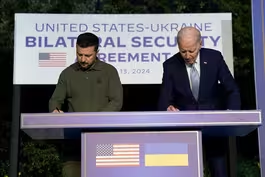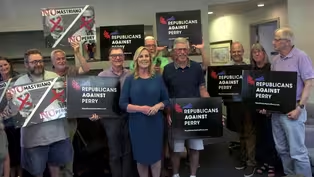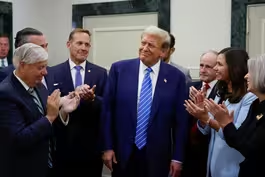
Parents, educators weigh in on safety and arming teachers
Clip: 6/13/2024 | 9m 50sVideo has Closed Captions
Parents and educators weigh in on school safety as more states arm teachers on campus
School shootings have left officials struggling with how to best protect students and staff and secure campuses. During this past year, several states have either approved or are considering measures allowing a teacher to carry a gun in the classroom. We hear varying opinions about this from parents, teachers and educators, and Stephanie Sy discusses more with a school security expert.
Problems playing video? | Closed Captioning Feedback
Problems playing video? | Closed Captioning Feedback
Major corporate funding for the PBS News Hour is provided by BDO, BNSF, Consumer Cellular, American Cruise Lines, and Raymond James. Funding for the PBS NewsHour Weekend is provided by...

Parents, educators weigh in on safety and arming teachers
Clip: 6/13/2024 | 9m 50sVideo has Closed Captions
School shootings have left officials struggling with how to best protect students and staff and secure campuses. During this past year, several states have either approved or are considering measures allowing a teacher to carry a gun in the classroom. We hear varying opinions about this from parents, teachers and educators, and Stephanie Sy discusses more with a school security expert.
Problems playing video? | Closed Captioning Feedback
How to Watch PBS News Hour
PBS News Hour is available to stream on pbs.org and the free PBS App, available on iPhone, Apple TV, Android TV, Android smartphones, Amazon Fire TV, Amazon Fire Tablet, Roku, Samsung Smart TV, and Vizio.
Providing Support for PBS.org
Learn Moreabout PBS online sponsorshipAMNA NAWAZ: Over the past decade, the number of school mass shootings has increased, leaving school officials across the country struggling with questions of how to best protect students and staff and secure campuses.
This past year, a number of states have either approved or are considering new measures that would allow a teacher to carry a gun in the classroom.
Polls show that the majority of Americans don't favor arming teachers, but there are varying views among parents, teachers and educators.
We're going to hear from some of them now before Stephanie Sy talks to an expert on school security.
ILEANA GONZALEZ, Teacher: I'm Ileana Gonzalez, and I live in Austin, Texas.
I have been a teacher for 22 years.
Thinking that people charged with loving and caring and guiding children would also be the people charged with shooting and killing the same child who might walk into their classroom one day, it's ludicrous.
I can't begin to imagine the day that I would be prepared to kill one of my own students.
I just can't.
JAN HUBLER, Retired Bus Driver: My name is Jan Hubler, and I live here in Oregon.
With all the school shootings that are going on, I think that it would just -- to have armed staff, trained armed staff, I should say, it would be an additional layer of protection for the kids.
ASDRUBAL QUINTERO, Teacher: My name is Asdrubal Quintero, and I live in New Orleans, Louisiana.
I do know that arming staff makes me extremely nervous.
That seems counter, like, productive for the goal of making sure that schools feel safe, especially considering that, like, statistics around people using guns and self-defense are very underwhelming.
AMY ATLAS, High School Parent: I am Amy Atlas, and I live in Valatie, New York.
My son is 16, goes to public school.
I don't think it should be required.
I think that's really an unfair thing to ask a teacher to take on.
But setting that aside, if you're a teacher, an administrator, and as long as you have the board's approval, I think it should be OK. ILEANA GONZALEZ: If we're going to pull out a wand, yes, I want legislation that improves the conditions around gun ownership and accessibility to gun ownership, period, end of story.
Teaching is a crazy hard profession.
It is super stressful.
It's underpaid, it's taxing.
It's -- you're emotionally exhausted.
You are physically exhausted at the end of the day.
I can't imagine also being combat-trained and, like, having to find the wherewithal to manage yourself in a combat setting.
JAN HUBLER: There are procedures and protocols in schools right now that, since we live in a rural area, where we have no local police force, we have to call and get a dispatch to come down.
So it's half-hour before we have anybody here.
I mean, there are state police in the area too, but it's going to take a while.
They are about a half-hour away to the other end.
And so I think it would be a good thing for us to have in our schools.
ASDRUBAL QUINTERO: So many of view, like, students as our own kids.
Like, the very idea of having to shoot a child is like -- I really -- I would be very, very shocked to see the teacher, or even a shooter, who'd be willing to do that.
AMY ATLAS: Maybe a license isn't enough.
Maybe they need to go through another sort of training that's specific to school and when you should, when you shouldn't, that kind of thing.
ILEANA GONZALEZ: There's also the logistical component involved in what it would take to actually arm teachers.
It would be an expense, not just in terms of the firearm, but the amount of training that would also need to be paid for, but also just the time investment.
ASDRUBAL QUINTERO: I do feel like most people, staff, students, families, would be extremely uncomfortable with the idea of admin or staff at school being armed and being the first line of defense against a school shooter.
The reckoning that a lot of us have kind of come to terms with as teachers is, like, we don't really know what the solution is, like, at all.
And that's kind of what makes it really scary.
STEPHANIE SY: In recent months, Tennessee and Iowa have joined more than two-thirds of states that allow teachers to carry guns in public schools when permitted by their school districts.
There are 16 states, plus the District of Columbia, that have laws that prohibit teachers from carrying guns at school.
For more on the implications of these policies, I'm by Kenneth Trump, president of national school safety and security services.
Ken, you're a school safety consultant.
You have testified before Congress.
Putting aside the fact that the powerful NRA lobby is behind arming teachers at schools, is there a valid argument that arming teachers may deter school shootings?
KENNETH TRUMP, President, National School Safety and Security Services: Well, we find that the vast majority of teachers want to be armed with technology and textbooks, but not firearms.
And in those states that have authorized it, there's a big difference between authorizing it, making it legal to do it, versus those that have actually taken up the law and decided to actually do so.
We're finding a very small number of school districts and states are allowing that to happen.
It's just not something that's on their agenda.
Look, if we're talking about arming teachers and support staff, we're talking about tasking them with performing a public safety function.
We would want a trained, certified public safety professional, a police officer, to take on that role, just like we want a trained, certified teacher to teach in the classroom.
We wouldn't take a police officer off the street at midnight shift in the back alley, give them a couple dozen hours of training and say, you're now a second grade teacher, enjoy the rest of your career.
STEPHANIE SY: So are you saying that the policy is hard to implement, but not necessarily ineffective or bad policy?
KENNETH TRUMP: Well, it is a bad policy, in my opinion, because it's a high-risk, high-liability proposition.
And the key is just what you said, implementation.
If you listen to the voices of those teachers, they have brought out some really important issues of implementation, not just the law, but how would it work in a school on a day-to-day basis?
The one powerful statement about, you're asking me to take a kid that I love support, nurture, and feel like the parent for that day during the school day, and then say that I might have to turn around and shoot and kill them.
There's a psychological piece to this, because training someone for a couple dozen hours on how to shoot, clean, and holster the gun is a lot less than what we require of our trained public safety professionals out in the community or police officers, right, with use of force continuum, shoot, don't shoot.
What's the scenario?
How do you gauge the situation?
How are you evaluating it?
What intermittent steps can you take to de-escalate without having to immediately turn to the firearm?
And then just how would it work during the day?
Where are the teachers who are going to store their guns?
How are they going to have -- who's going to have access to those?
And, lastly, who's going to be managing all this?
The principal is now the de facto police chief, in addition to the principal, to make sure that teachers have the current certification, the right firearm, the right qualifications and training, the right type of ammunition, that they're carrying it right, how - - what procedures for disciplinary.
You start getting into these weeds, and it's a really big task, in addition to being educators and administrators during the day, that really goes beyond a reality of fidelity of implementation if somebody picks that up.
So there's a lot more than saying you can do it.
The question is, how would you do it?
And I say, it's very problematic.
STEPHANIE SY: On the other extreme, Ken, you have these states that have issued blanket bans prohibiting teachers from carrying firearms in their school?
Is that good policy?
Because, in that piece, you also heard from that rural teacher, who said the police are half-an-hour away.
And proponents of arming teachers say, shouldn't that teacher have the right to carry a gun for her own self-defense and to defend her students?
KENNETH TRUMP: That's one of the biggest argument is -- comes from rural areas, where you have small or sometimes very, very tiny police departments that are far, far away.
My answer to that is that we have school resource officer programs, police officers in school.
If it's that big of a priority to have an armed presence on campus, then invest your district resources.
Some states, many states now actually put on additional levies where voters can vote to determine if they want to pay additional security costs, and bring yourself a dedicated full-time officer for your school or school district on a day-to-day basis who will be there.
Put your money into that priority, but do it right.
And it's an issue of not having -- you can't have it both ways.
You can't -- and think about it.
We're asking -- in many school communities today, it's a very contentious issue of having police in school, period, especially after the murder of George Floyd.
I think there are very conflicting messages.
I think the argument for having an armed presence on campus is the trained, commissioned certified police officer with the appropriate model, the right officer and the additional training.
If you're going to do it, do it right.
STEPHANIE SY: Kenneth Trump, a school safety consultant, thanks so much for joining the "NewsHour."
KENNETH TRUMP: Thanks for having me, Stephanie.
G7 backs using frozen Russian assets to aid Ukraine
Video has Closed Captions
Clip: 6/13/2024 | 8m 40s | Biden, Zelenskyy sign security pact as G7 backs using frozen Russian assets to aid Ukraine (8m 40s)
How some Pennsylvania Republicans protesting party extremism
Video has Closed Captions
Clip: 6/13/2024 | 10m 28s | How some Pennsylvania Republicans are using a congressional race to protest GOP extremism (10m 28s)
Inside filmmaker Steve McQueen's new immersive art exhibit
Video has Closed Captions
Clip: 6/13/2024 | 7m 7s | Inside Oscar-winning filmmaker Steve McQueen's new immersive art exhibit (7m 7s)
Supreme Court rejects challenge to mifepristone
Video has Closed Captions
Clip: 6/13/2024 | 2m 59s | Access to mifepristone remains unchanged as Supreme Court rejects abortion pill challenge (2m 59s)
Trump visits Capitol Hill to meet with GOP lawmakers
Video has Closed Captions
Clip: 6/13/2024 | 5m 54s | Trump visits Capitol Hill for first time since Jan. 6 to meet with GOP lawmakers (5m 54s)
Providing Support for PBS.org
Learn Moreabout PBS online sponsorshipSupport for PBS provided by:
Major corporate funding for the PBS News Hour is provided by BDO, BNSF, Consumer Cellular, American Cruise Lines, and Raymond James. Funding for the PBS NewsHour Weekend is provided by...
















